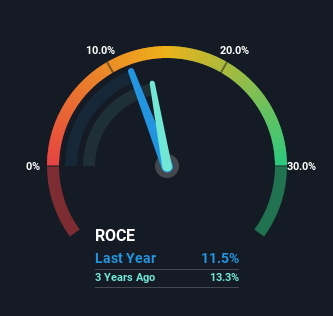When researching a stock for investment, what can tell us that the company is in decline? When we see a declining return on capital employed (ROCE) in conjunction with a declining base of capital employed, that's often how a mature business shows signs of aging. Ultimately this means that the company is earning less per dollar invested and on top of that, it's shrinking its base of capital employed. So after glancing at the trends within Johnson Matthey (LON:JMAT), we weren't too hopeful.
Return On Capital Employed (ROCE): What Is It?
For those who don't know, ROCE is a measure of a company's yearly pre-tax profit (its return), relative to the capital employed in the business. To calculate this metric for Johnson Matthey, this is the formula:
Return on Capital Employed = Earnings Before Interest and Tax (EBIT) ÷ (Total Assets - Current Liabilities)
0.12 = UK£442m ÷ (UK£6.9b - UK£3.0b) (Based on the trailing twelve months to September 2022).
So, Johnson Matthey has an ROCE of 12%. That's a relatively normal return on capital, and it's around the 10% generated by the Chemicals industry.
View our latest analysis for Johnson Matthey

In the above chart we have measured Johnson Matthey's prior ROCE against its prior performance, but the future is arguably more important. If you'd like, you can check out the forecasts from the analysts covering Johnson Matthey here for free.
So How Is Johnson Matthey's ROCE Trending?
There is reason to be cautious about Johnson Matthey, given the returns are trending downwards. About five years ago, returns on capital were 15%, however they're now substantially lower than that as we saw above. Meanwhile, capital employed in the business has stayed roughly the flat over the period. Since returns are falling and the business has the same amount of assets employed, this can suggest it's a mature business that hasn't had much growth in the last five years. If these trends continue, we wouldn't expect Johnson Matthey to turn into a multi-bagger.
On a side note, Johnson Matthey's current liabilities have increased over the last five years to 44% of total assets, effectively distorting the ROCE to some degree. If current liabilities hadn't increased as much as they did, the ROCE could actually be even lower. What this means is that in reality, a rather large portion of the business is being funded by the likes of the company's suppliers or short-term creditors, which can bring some risks of its own.
In Conclusion...
In summary, it's unfortunate that Johnson Matthey is generating lower returns from the same amount of capital. Investors haven't taken kindly to these developments, since the stock has declined 19% from where it was five years ago. With underlying trends that aren't great in these areas, we'd consider looking elsewhere.
One more thing to note, we've identified 1 warning sign with Johnson Matthey and understanding this should be part of your investment process.
While Johnson Matthey may not currently earn the highest returns, we've compiled a list of companies that currently earn more than 25% return on equity. Check out this free list here.
New: Manage All Your Stock Portfolios in One Place
We've created the ultimate portfolio companion for stock investors, and it's free.
• Connect an unlimited number of Portfolios and see your total in one currency
• Be alerted to new Warning Signs or Risks via email or mobile
• Track the Fair Value of your stocks
Have feedback on this article? Concerned about the content? Get in touch with us directly. Alternatively, email editorial-team (at) simplywallst.com.
This article by Simply Wall St is general in nature. We provide commentary based on historical data and analyst forecasts only using an unbiased methodology and our articles are not intended to be financial advice. It does not constitute a recommendation to buy or sell any stock, and does not take account of your objectives, or your financial situation. We aim to bring you long-term focused analysis driven by fundamental data. Note that our analysis may not factor in the latest price-sensitive company announcements or qualitative material. Simply Wall St has no position in any stocks mentioned.
About LSE:JMAT
Johnson Matthey
Engages in the clean air, catalyst and hydrogen technology, and platinum group metals (PGM) service businesses in the United Kingdom, Germany, rest of Europe, the United States, rest of North America, China, rest of Asia, and internationally.
Undervalued with excellent balance sheet.
Similar Companies
Market Insights
Community Narratives



